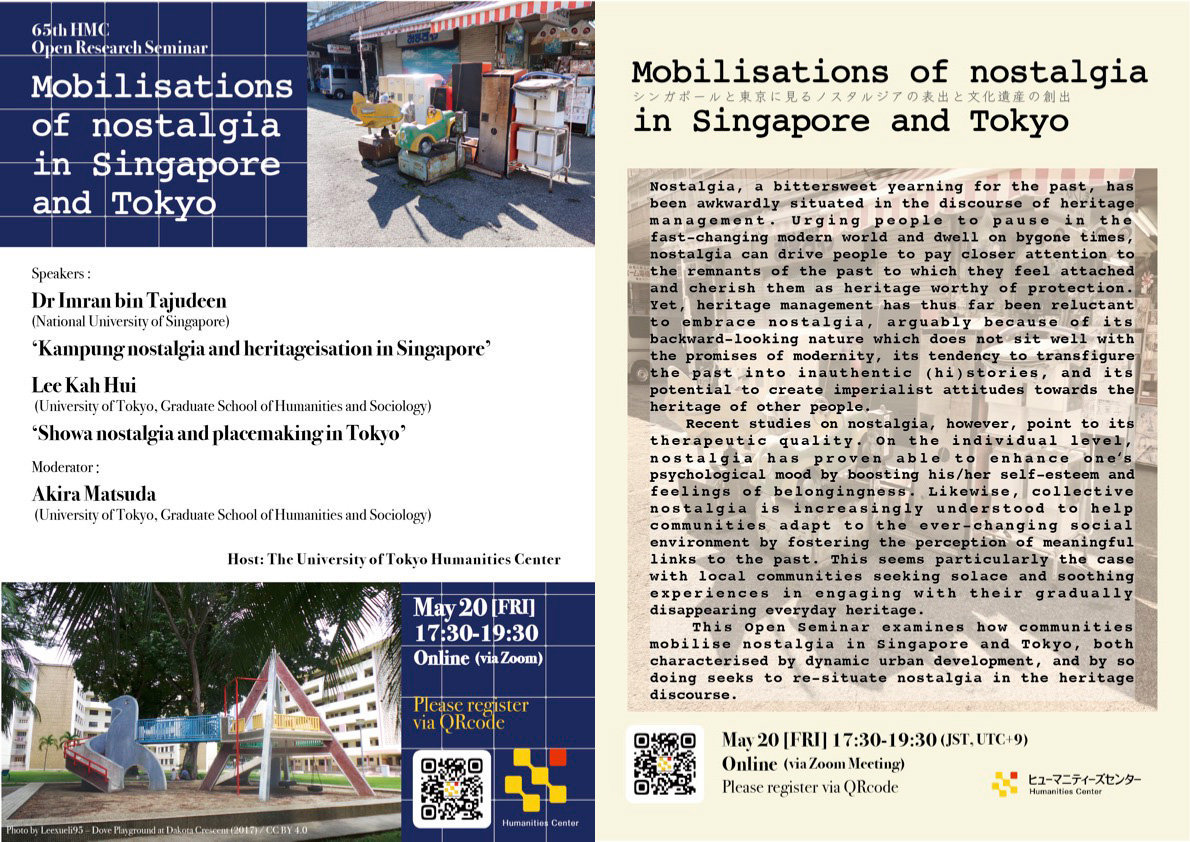Mobilisations of nostalgia in Singapore and Tokyo
シンガポールと東京に見るノスタルジアの表出と文化遺産の創出

- Date & Time: Friday, May 20, 2022, 5:30 - 7:30pm (JST, UTC+9)
- Venue: Online (via Zoom Meeting)
- Speakers:
- Dr Imran bin Tajudeen (National University of Singapore)
'Kampung nostalgia and heritageisation in Singapore' - Lee Kah Hui (University of Tokyo, Graduate School of Humanities and Sociology)
'Showa nostalgia and placemaking in Tokyo'
- Dr Imran bin Tajudeen (National University of Singapore)
- Moderator: Akira Matsuda (University of Tokyo, Graduate School of Humanities and Sociology)
- Language: English
- Host: The University of Tokyo Humanities Center
- 日時:2022年5月20日(金)17:30 - 19:30
- 場所:Zoomオンライン開催
- 報告者:
- イムラン・ビン・タジュディーン(シンガポール国立大学)
'Kampung nostalgia and heritageisation in Singapore' - リー・カーフイ(東京大学大学院人文社会系研究科)
'Showa nostalgia and placemaking in Tokyo'
- イムラン・ビン・タジュディーン(シンガポール国立大学)
- モデレーター:松田 陽(東京大学大学院人文社会系研究科)
- 言語:英語
- 主催:東京大学ヒューマニティーズセンター
Registration: Please register below(要事前登録)
https://u-tokyo-ac-jp.zoom.us/meeting/register/tZUld-2gqj4tHdywCaSZN4YJ6vn5PNaTVkRd
Nostalgia, a bittersweet yearning for the past, has been awkwardly situated in the discourse of heritage management. Urging people to pause in the fast-changing modern world and dwell on bygone times, nostalgia can drive people to pay closer attention to the remnants of the past to which they feel attached and cherish them as heritage worthy of protection. Yet, heritage management has thus far been reluctant to embrace nostalgia, arguably because of its backward-looking nature which does not sit well with the promises of modernity, its tendency to transfigure the past into inauthentic (hi)stories, and its potential to create imperialist attitudes towards the heritage of other people.
Recent studies on nostalgia, however, point to its therapeutic quality. On the individual level, nostalgia has proven able to enhance one's psychological mood by boosting his/her self-esteem and feelings of belongingness. Likewise, collective nostalgia is increasingly understood to help communities adapt to the ever-changing social environment by fostering the perception of meaningful links to the past. This seems particularly the case with local communities seeking solace and soothing experiences in engaging with their gradually disappearing everyday heritage.
This Open Seminar examines how communities mobilise nostalgia in Singapore and Tokyo, both characterised by dynamic urban development, and by so doing seeks to re-situate nostalgia in the heritage discourse.
「過去に対する感傷的な思慕」と定義されるノスタルジアは、文化遺産の専門家たちがあまり使いたがらない言葉である。それは、ノスタルジアが後ろ向きであり、過去を美化するニセモノであり、場合によっては帝国主義的でもあると捉えられているからだ。文化遺産は懐古主義と峻別すべき、とでも言うべき意識が確実にある。
しかし、近年のノスタルジア研究では、ノスタルジアが目まぐるしく変化する現代社会の中で人々の心に安定をもたらすという肯定的な評価も浮上している。実際、ノスタルジアの「癒やし」の効果に着目しながら、文化遺産を通した回想法を模索する動きも出てきている。
本セミナーでは、目まぐるしく変化するシンガポールと東京という都市空間において、人々が過ぎ去った時代をどのように集団的に懐古・追慕・理想化し、そのことによっていかなる社会的・商業的活動が新たに生まれているかを明らかにする。その目的は、文化遺産の理解と実践の中にノスタルジアを位置づけ直すことにある。


